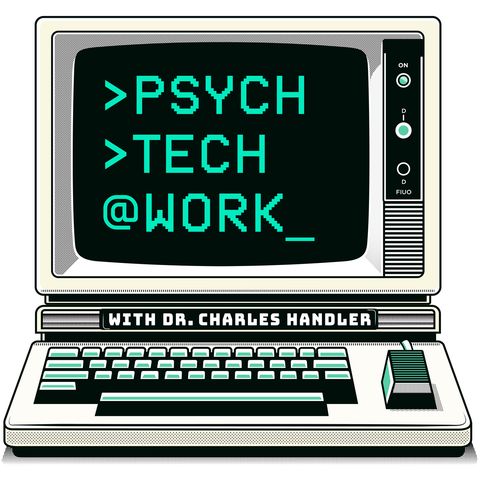20 SEP 2024 · "In the absence of trust, people will disengage. No amount of technology or process can replace the human need for belief and belonging."
-Julian Stodd
This episode is a must listen for those looking to expand their ideas about leadership, technology, and the psychology of work!In this episode of "Psych Tech @ Work,"
I welcome Julian Stodd, founder of Sea Salt Learning and prolific author whose work challenges conventional views on leadership, work, and technology, by looking at them through new paradigms. Our conversation was refreshing because Julian offered thoughtful reframing of my ideas about psychology in the workplace that are worth noting.
In our conversation Julian reframes the way we think about the evolving workplace, focusing on the shift from traditional hierarchical structures to social leadership and distributed power. His perspectives offer a compelling critique of the conventional social contract between organizations and employees, arguing that this contract has been fundamentally broken by modern work dynamics.
Julian highlights the role of technology, particularly AI, as a tool that both amplifies and disrupts traditional power dynamics within organizations. He also emphasizes the need for organizations to adapt, not just by automating tasks but by fostering trust, belief, and a sense of belonging to truly engage employees.
This conversation is a powerful reminder that organizations must evolve beyond transactional relationships and embrace the social elements that drive real engagement and productivity.
Throughout the episode, Julian emphasized the critical balance between formal organizational structures and the informal, social dynamics that truly drive engagement and innovation. He suggested that many organizations over-rely on formal systems—hierarchies, policies, and processes—while underestimating the power of social structures, such as networks of trust, influence, and collaboration.
Julian repeatedly showed me a new way to look at my ideas about the psychology of the workplace.
For instance:
The Traditional Leadership Model:
- I Mention: I spoke about the role of leaders in providing clear direction and overseeing teams to ensure productivity.
- Julian’s Reframe: Julian challenged this conventional view, arguing that leadership in the modern era should be about social authority rather than formal hierarchy. He explained that leadership is increasingly granted by the community based on trust and belief, not just a title or position, and that successful leaders must earn this trust by engaging meaningfully with their teams.
The Psychological Contract Between Employers and Employees:
- I Mention: The importance of the traditional idea of the psychological contract as a way to understand the employer-employee relationship, where employees trade their time and skills for compensation and job security.
- Julian’s Reframe: Julian reframed this concept by stating that the traditional social contract has been broken. He argued that organizations need to move beyond seeing employees as resources or commodities. Instead, they should recognize that people are investing their belief and engagement in return for trust, growth, and belonging. Julian emphasized that organizations must rethink this relationship to thrive in the modern, social age.
The Importance of Individual Differences:
- I mention: The importance of the concept of individual differences, focusing on the traditional scientific approach that measures and assesses traits like personality, intelligence, and abilities to predict workplace behaviors and outcomes.
- Julian’s Reframe: Julian suggested a shift away from solely focusing on the science of individual differences as fixed traits to considering individuals as dynamic and adaptable within social systems. He argued that while the science of individual differences is important, it often overlooks the relational and contextual factors that influence behavior. Julian emphasized that people are shaped by their environment, relationships, and the social dynamics they are part of. He proposed that instead of just measuring traits in isolation, organizations should focus on understanding how individuals interact with the system around them and how they can grow and evolve within that system.
"Take it or Leave it": Julian and I give our opinions on articles that suggest a declining need for human workers in the workplace of the future.
- https://sifted.eu/articles/autonomous-companies-ai
- Summary: This article from Sifted discusses the rise of fully autonomous companies that leverage AI agents to run without employees. While the article presents a futuristic view of e-commerce and automation, Julian and Charles critique its narrow focus and overhyped narrative, emphasizing that while AI may automate some functions, people will remain central to innovation and decision-making.
- https://www.hfsresearch.com/research/the-autonomous-enterprise-everyones-trying-to-get-there-can-we/
- Summary: This article from HFS explores how data-driven decision-making and automation are shaping the future of organizations. Julian and Charles discuss the potential for organizations to become more efficient through data governance and AI, but caution that organizations still need human judgment and emotional engagement to make meaningful decisions.


